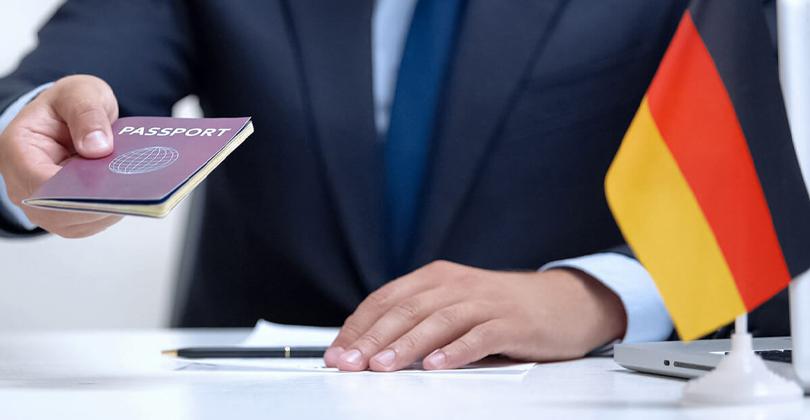Some of the most well-known brands and companies in the world are based in Germany,
because of the country’s booming economy. As the fourth largest economy in the world,
Germany is the first choice for many immigrants looking for better working and living
conditions, especially those in third-world nations.
If you fall into this category of people who wish to work in Germany, then this guide is
for you. We’ll give you all the information you need, like the different types of
employment visas, how to apply, what documents you need, and answers to other
questions that people often have about working in Germany.

Categories Of Work Visas in Germany
For you to live and work in Germany, you must have a German work visa and a residence
permit. The good news is that you don’t have to apply for this separately and you can get
them both at the German Immigration Authority Office (Ausländerbehörde) through a
single application. If you’re from a non-EU country, you’ll have to get your work visa
from a German Embassy or Consulate in your home country.
There are various categories of work visas depending on the kind of work you want to
pursue in the country. They include:
- General work permit: This type of work permit is issued to foreign workers who
have secured job positions in Germany that could not be filled by EU nationals.
You don’t need a specific set of skills for this, as long as you’re qualified for the
job.
- Highly skilled workers permit: As the name implies, it is for highly skilled
individuals with a lot of experience and high income.
- EU Blue Card: To apply for an EU Blue Card, your annual salary has to be at
least €56,400 and €43,992 if you are in a shortage occupation.
- Work permit for freelancers: If you are a business owner, self-employed or a
freelancer and you can prove that you have prospective clients, this is the visa you
should apply for.
- Working Holiday Visa: Working holiday visas are easier to get than general work
visas or Blue Cards. It allows you to work in Germany for one year and is open
mainly to citizens of Australia, Israel, New Zealand, and Japan who are between
the ages of 18-30.
- Youth Mobility Visa: Open to Canadian citizens between the ages of 18 to 35
years, the youth mobility visa is similar to the working holiday visa as it allows
you to work in Germany for a year.
Categories of Eligible Countries and Foreign Workers.
Before going to Germany, people from third-world countries need to get a work visa.
Meanwhile, citizens of EU/EEA member states are allowed to enter the country without a
visa, after which they can apply for a residence permit for work purposes. Some other
countries that are allowed visas on arrival are Australia, Canada, Israel, Japan, New
Zealand, Switzerland, and the Republic of Korea. Click here to see the list of countries
that require a visa before entry into Germany.
Anyone from outside of Germany can live and work there as long as they meet the
requirements for a German employment visa. Specifically, the category of people eligible
to apply for a German employment visa includes:
- Highly qualified foreigners, particularly researchers with special technical knowledge and teaching personnel in prominent positions.
- Intra-corporate transferees like managers and specialists.
- Third-world country nationals with a university degree or non-academic vocational qualification. To get a German work visa through this means, first, you
must have a concrete job offer, your education must be recognized as equivalent to
a German degree and lastly, there must be a shortage of skilled workers in the
profession you wish to practice in the country.
Required Documents For German Visa Application
There are several documents you must submit during your visa application at the German
embassy in your country, which are a deciding factor alongside the interview as to
whether or not your visa application will be granted. They include
- Two fully completed forms, printed and signed.
- Two passport photographs. You’ll be needing a 34 × 45mm biometric picture. You
do not have to cut the photographs yourself, as they have a photo booth and the
necessary tools to do that at the Ausländerbehörde.
- A valid national passport. Your passport must be valid for another 6 months, must
have been issued in the last 10 years, must have at least 2 free pages and contain
your signature.
- Proof of residence e.g driver’s license and/or utility bill in your name showing you
reside in the country where you are applying from.
- Proof of health insurance coverage in Germany. You must clearly show if your
employment covers your health insurance or that you have made provision for
separate health insurance.
- Your employment contract with a detailed description of your employment in
Germany and gross annual salary.
- Proof of qualifications including all your necessary academic certificates Your updated CV indicating your qualifications and job experiences
- A personal cover letter. This will contain a detailed explanation of the purpose and during your stay.
- Proof of paid visa fee, which is usually around €75
- Proof of a clean criminal record.
- Declaration of the accuracy of information to guarantee that all documents and
information you have provided are genuine.
How To Apply For A German Work Visa
- Apply for a Job-seeker Visa or an Employment Visa- Fill out and sign the
application form. You must also print, sign and bring the completed forms with
you to the appointment at the embassy. Note that handwritten forms are not
allowed.
- Make an appointment at the Ausländerbehörde (German embassy, consulate or
visa application centre in your country) for a visa interview at least six months before your trip.
- Gather the required documents.
- Submit the residence and work permit application- Before you submit the
application form, you have to present your appointment letter for verification after
which you will be issued a token. If your application is complete, the embassy will
hold on to your passport temporarily while they verify your application.
- Pay the German Employment Work Visa fee and keep the receipt safe. You’ll need
it as proof to collect your passport.
- Attend the interview- Be punctual and have all the necessary documents at hand.
You’ll be asked questions about your background and your reason for travelling to
Germany, so get your answers ready.
- Wait for a response on your visa application.
Visa Application Processing Time
The processing time for a German employment visa may take one month to three months.
Generally, the time it takes for your visa to be approved is largely dependent on the
German embassy or consulate. Your home country
Where To Apply For A German Work Visa
Foreigners looking to work in Germany are to apply for their employment visas through
the representative bodies of Germany in their various countries. These include:
- A German consulate
- German embassy
- A Visa Application Center
- The German Consulate/Embassy is located in a neighbouring country, which is in absence of any representative body in your home country.
- The consulate/embassy of another country in your home country to which Germany has outsourced its visa application and admission rights.
Things To Do When You Arrive in Germany On A Work Visa
Once you have your work visa, you can now travel to Germany. On arrival, there are still
some procedures that you must complete in the country to obtain a German residence
permit. First, you must go to the Foreigner’s Office in Germany. Locate the one closest to
you and book an appointment.
You’ll need to attend an interview, and for that, you’ll need the following documents.
- A valid national passport
- Two photos
- Application form for the residence permit
- Report of a clean criminal record
- Proof of job offer
- Proof of German language
- Health insurance confirmation
Frequently Asked Questions
- How long is a residence work permit valid in Germany?
Your residence work permit is valid for the time your employment contract lasts. If your
contract is for 3 years, then your permit will be valid for 3 years. You can, however,
renew or extend it for as long as you need, as long as you keep your job.
- How much do I need to move to Germany on a work visa?
There is no specific amount you must have before moving to Germany on a work visa.
However, you must be able to prove to the embassy during your application process and
interview that you have the financial capacity to take care of yourself in Germany. Even
if you already have a job offer, the rule of thumb is that you must provide evidence of the
initial funds you’ll need to cover your expenses before you get your first salary.
Another important criterion is that you must have proper health insurance coverage.
There are public and private healthcare insurance schemes in Germany. If your salary
falls under €60,750 per year, then you’re required to enrol in a public insurance scheme
where 14.6% of your gross salary will be deducted monthly. You get to pay half while
your employer pays the other half.
If you earn more than €60,750 per year, you’re free to subscribe to a private health
insurance scheme of your choice.
- Can I relocate to Germany with my family on a work visa?
If you have gotten your German work permit, you are allowed to bring your immediate
family members with you through a Family Reunion Visa. Such family members include
your spouse, minor children, including adopted ones, adult children who are dependent
on you, elderly parents or siblings who are dependent on you.
Conclusion.
Moving to Germany for work purposes can be a life-changing experience, and I trust that
you’ll make good use of the information in this post to start your relocation journey today.
For more information on visa application and other requirements, visit the Germany visa application official website.




